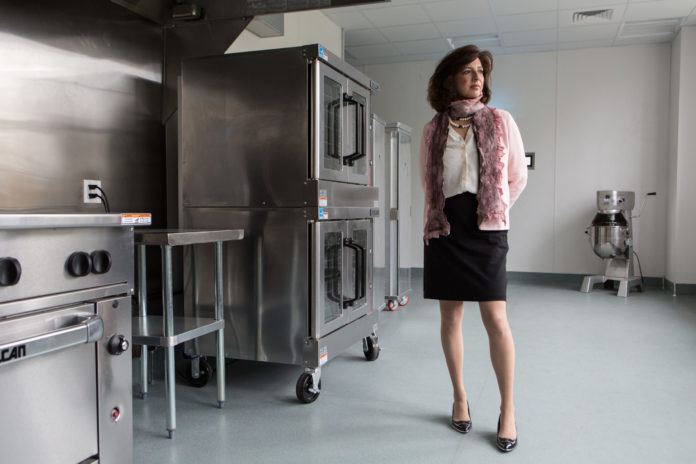
Beating a life-threatening illness led Lisa J. Raiola to launch a culinary incubator on Oct. 3 that is breathing new life into not only her career but the careers of 30 startup entrepreneurs.
At 52, Raiola, who lives in Bristol with her husband, Waterman Brown, is the founder and president of Hope & Main in Warren, as well as vice president for institutional advancement at Roger Williams University.
Between 2006 and 2009, however, she had to leave a busy career at Brown University to battle a disease she declined to name. During that time, the importance of nutrition emerged not only as something that could help her fight the illness, but something she could control.
As she became increasingly grateful to the people who brought her healthy food and cooked for her during that time, she said, she hit upon an idea: delivering food instead of flowers to medically challenged shut-ins.
Though that business has not yet materialized, it led her to explore a possible site for it in Warren in the fall of 2009. Town Hall officials then pointed her to The Main Street School, a 17,000-square-foot shuttered elementary school that was for sale.
What happened next was an epiphany.
“I stood there thinking, ‘I don’t need such a big place,’ ” she recalled, “but it occurred to me: I bet there are a lot of people like me who want to start small food businesses but don’t have the capital and space to do this. I thought, ‘This could be a place where they could do that and we could all share in the expense.’ ”
The location of the smaller, first property she had looked at was at Hope and Main streets, and the word “hope” held special meaning for her, given her arduous journey back to health.
Next, her team-building, education and fundraising skills kicked into high gear.
“I put together a team of people that included people in finance and business development, architects and engineers, [and] the Warren town planner,” she said. “We started to conceptualize the physical design as well as the programming and then think about who would be the funders.”
“My fondest wish was to stay in Rhode Island, see my kids get jobs in Rhode Island, and see Rhode Island thrive,” said the Philadelphia native.
Raiola needed 125 registered voters to vote on the sale of the building in October of 2012. Four hundred townspeople showed up – and with a handful in opposition, the sale went through. (She has used about $250,000 of her own money to complete the deal, she said.)
Today, Hope and Main has 6,000 square feet of shared-use kitchen space, including three commercial kitchens and a demonstration kitchen that is used as a classroom to connect the community to food. What had served as a playground should this spring become space for a farmers market and “meet your maker” market, she said.
Still working at RWU, Raiola has hired five staffers and leads a board of 15 directors with food experience who have steered the project as it materialized, she said.
Foxpoint Pickling is one of the startups at Hope & Main that has raised $15,000 through Kickstarter and has a contract for its products with the Johnny Rockets hamburger restaurant chain, she said.
“The shared platform has given these companies a big voice and profile,” Raiola said. “It’s kind of a halo effect: The products are made in Rhode Island.”
“We’re a startup for startups,” she said. “They’re all very different: they all have different licensing, labeling and packaging needs. We’re not opening a peanut butter factory where it’s one product and one business. We have salsa, jam, bread, smoked fish, coconut butter. We needed a coconut grinder from China with electrical instructions in Chinese. It’s little things like that [that proved to be challenging].”
But the ribbon-cutting on Oct. 3, done with her entrepreneurs on hand, made it all worthwhile.
“When I started this project years ago, I knew it would be for those people like me who have a tremendous passion for what they do, but I didn’t know who they’d be,” she said. “It’s like giving birth to 30 babies. There was no more fulfilling feeling.”
The business plan for Hope & Main, as required by the USDA, is to create 99 direct jobs in three years. Using the multiplier effect of 2.3 indirect jobs created for every single direct job, Raiola is aiming to create 236 direct and indirect jobs as well, she said.
The projections are consistent with other food incubators around the country, including ones that served as models for Hope & Main: Jamaica Plain’s Crop Circle Kitchen in Boston, the Western Massachusetts Food Processing Center in Greenfield, Mass., and the Culinary Enterprise Center in Philadelphia.
“All three are nonprofits,” she said. “I had to learn from them: This was pretty daunting as it was, so I’m kind of glad I didn’t invent the idea after all.” •












